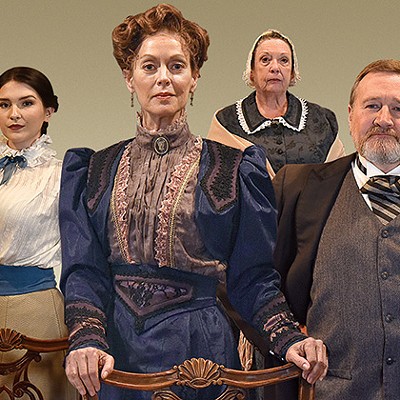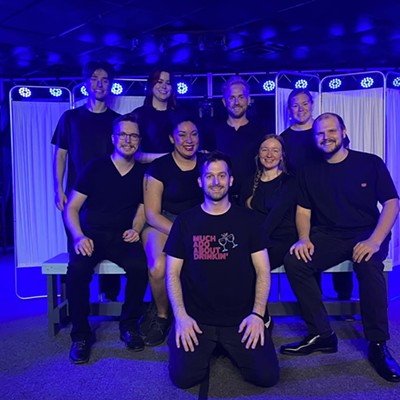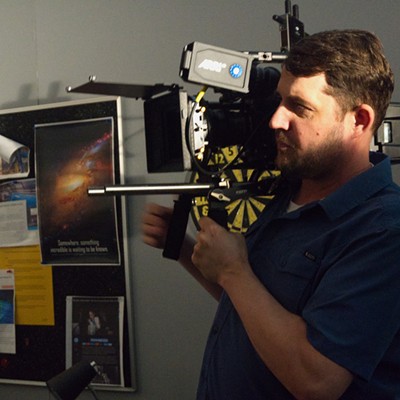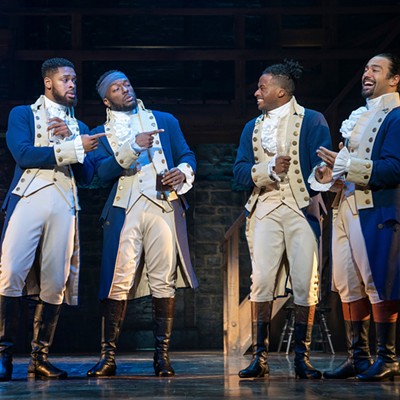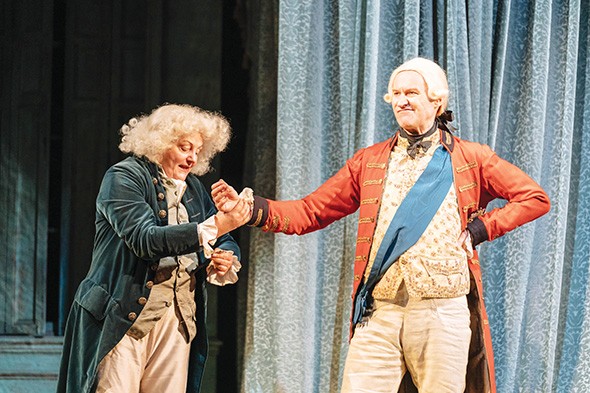
Critics raved. When the Adam Penford-directed production of Alan Bennett’s The Madness of King George III ran at England’s Nottingham Playhouse in November, The Guardian’s Kate Maltby called it “a technically excellent production of a modern classic” and wrote that actor Mark Gatiss (Mycroft Holmes in BBC’s Sherlock) delivered a “tour de force” performance in the title role, offering a “viscerally repulsive depiction of the gap between public and private life.” The Observer’s Clare Brennan, meanwhile, wrote, “Whether haughtily regal and mildly eccentric, or blubbering in his speech and wildly disordered in his movements, Mark Gatiss is sensational. Through him we feel George’s agonies of body and mind: a suppurating-skinned, sentient creature tortured by ill-judged ‘cures’; a king becomes a thing to his subjects.” The Telegraph’s Dominic Cavendish wrote that audiences had the chance to “see Mark Gatiss come into his own as a leading theatre actor, like some bald eagle taking magnificent wing.”
The production closed last year, but Oklahoma City theatergoers will have the chance to see it 6 p.m. Sunday at Visual and Performing Arts Center Theater at Oklahoma City Community College (OCCC), 7777 S. May Ave. The play, a fictionalized account of the queen and prime minister’s efforts to conceal the king’s struggle with mental illness as rivals attempt a power grab, is presented as a prerecorded encore presentation of National Theatre Live’s worldwide broadcast, which was originally transmitted live via satellite to movie theaters in November. OCCC began screening prerecorded National Theatre Live plays for audiences in 2015 in a partnership with Oklahoma City Repertory Theatre (CityRep).
Linda Bosteels, performing arts series coordinator at OCCC, said the National Theatre Live program offers theatrical experiences that might be otherwise inaccessible.
“I think the real benefit is that people in the audience can see excellent plays for a reasonable price,” Bosteels said. “The normal person isn’t able to go to London’s West End to see Benedict Cumberbatch in Hamlet, so it gives the audience a wide perspective of different types of plays, different writers, different actors. It’s just a well-rounded production series of different plays. Some of them are written by Shakespeare, others are written by Alan Bennett and there’s a number of directors that are doing this. And obviously each one is different, but I think one of the real interesting things is seeing different, shall we say, stars in different roles.”
In addition to Cumberbatch’s turns in Hamlet and Frankenstein, past National Theatre Live presentations at OCCC included Tony Award-winning The Curious Incident of the Dog in the Night-Time and a production of Macbeth with acclaimed Shakespearian actor Rory Kinnear in the title role. Bosteels said the experience of seeing the play on the big screen feels more like attending a live production than sitting in a movie.
“It really seems like you’re watching the play,” she said. “It’s amazing to be there. They have several cameras filming the play at the same time, but it really feels like you are there in the audience.”
In an interview on Nottingham Playhouse’s YouTube channel, Gatiss said knowing the play would be “beaming out” to theaters around the world gave him “a curious combination of sort of first-night nerves and thrill,” but that he wouldn’t attempt to tailor his critically praised performance for the screen when it was broadcast for National Theatre Live.
“I think that’s where the madness lies, as they say,” Gatiss said in the interview. “I think you have to just do it. … I think you can’t suddenly say, ‘This is for a film, so everything becomes really tiny.’ I think you have to just make it as close to the live experience as possible.”
In the same interview, Penford, the play’s director, did contend that preparing for a big-screen broadcast required some technical consideration.
“You usually have to make slight adjustments, particularly to props or wigs or makeup,” Penford said, “because onstage they look absolutely brilliant, but as soon as they are onscreen, suddenly you start to realize they need just a bit more definition.”
Set in 1788, the play, which originally opened in 1991, was adapted into a film in 1994, but Gatiss said George III’s mental issues and the ramifications they had for the entire country are themes that still apply in the 21st century.
“Despite his sort of insistence on court etiquette, he really was a man of the people and knew what he was doing, I think,” Gatiss said in the interview. “He had a sort of eye on the future, and this is how we must be. So the destruction of that, and the disintegration of that I find very exciting and also very moving. The people around him are going, ‘Don’t be ill. You’re not ill, are you?’ … It’s a different world. He’s not just a constitutional monarch exactly; there is a lot more riding on it than that. It’s the health of the nation, isn’t it? That sort of also rings true to this day as with the president or a head of state of any kind. That’s the country as we perceive it, and if the king is mad, the country is sick.”
Bosteels said OCCC purchased a special projector to screen the National Theatre Live presentations and the theater is equipped with Dolby surround sound. However, audiences for the screenings have been small.
“The people that have been there have really liked it,” she said, “but I don’t think many people know about it because we normally don’t have that many people come. It’s a 1,000-seat theater, so they’ve got the place all to themselves usually.”
In the interview for Nottingham Playhouse, Gatiss said he was surprised to hear that audiences in National Theatre Live broadcasts applaud at the end.
“I thought, ‘This is so weird, isn’t it?’” Gatiss said. “Of course you get no benefit from that because you didn’t get the ovation. It’s just remote.”
Audiences at OCCC will also have the chance to see Ian McKellen play in King Lear on March 10 in a performance The Guardian’s Arifa Akbar wrote “would make for a perfect swan song.” Playwright David Hare’s political drama I’m Not Running — which The Guardian’s Michael Billington wrote “pricks the mind and boasts a strong performance from Siân Brooke,” is “packed with sharp and witty apercus and highly quotable lines” and “shows Hare’s capacity to use theatre to take the moral temperature of the times” — is scheduled to screen April 28.
Visit tickets.occc.edu.




